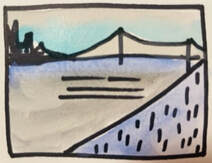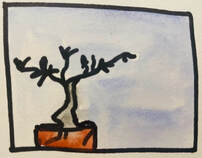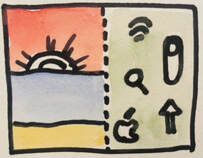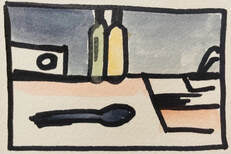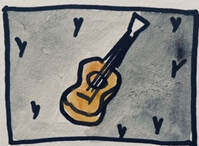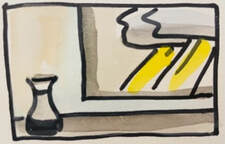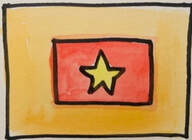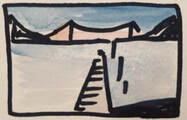|
Victoria, 11th - Oakland, CA
It’s too late to be out on a Wednesday night. I have a test tomorrow, but tonight, my full focus was on my family. The rain is coming down in sheets, definitely not driving weather. The usually quiet town of Saint Helena is filled with continuous whistling wind. My dad runs to the car, using his laundry bag as a shield from the elements. From the porch, my mom looks at me, smiles, though it's more of a grimace, and retreats to her house. Sitting in the car, I dread the hour and a half to come. Not only is it long, but it is also the physical manifestation of the force driving my world apart. As my dad and I pull away, I watch the house on Taniter Street. The warm yellow light from inside the brown wood house portrays a family living in perfect harmony. Two parents. Two kids. In the same house. Not real. Inside, my sister lives a parallel life. She is getting ready for bed, brushing her teeth, and dancing around with a youthfulness that had been drained out of her years ago. Since the move, her passion and radiance have returned. She dresses the way she wants, plays hours of tennis, and is alive again. Despite all her positive changes, the move has left me in pieces. I no longer have my person. It made Wednesday the best. There is a void in the car. Today was too draining to talk about anything that matters. I long to return to an hour ago, when we were sitting around the dinner table like it was a normal Wednesday night. Instead, my dad turns on the radio and we prepare for the hour and a half drive ahead. The chorus of “Happier” by Ed Sheeran fills the car. I sink into my seat. Ironic. As we cruise down Route 29, the rain gets heavier. The shoulder is covered in leaves and branches. The visibility goes in and out, and I anxiously fiddle with my big sis necklace. Though it usually brings me comfort, now it is a reminder of the gaping hole in my life. On the ride up, my mom and I had plenty of things to talk about. There was a hopefulness in the air. We were jumping at the opportunity to cosplay normalcy. We watched as the city turned to suburbs and after an hour—vineyards. Now, I am mourning the return to ordinary life, where my family is fractured. My dad breaks the silence. “Do you have any homework tonight?” “Nooooo!” I respond, annoyed. “I always do all my homework for Thursday early so we can be in Saint Helena for as long as possible.” Since the move, my parents have forgotten practically everything I say. I constantly have to remind them what time to pick me up at school or what my plans are for the day. My dad starts to respond, “Sorry buggy,” I interrupt, “You and Mama forget literally everything I tell you. Ever since the move…” I pause and turn toward my dad. His grip tightens on the steering wheel, and his lips purse. Oh no. I went too far. “Vickyyyy,” He groans, “You know we have a lot going on. All of us have to…” I’ve heard this too many times, so I just tune him out. However I respond, it wouldn’t matter—they won't listen, they can’t. I watch my parents lug their bags back and forth and notice how they cling to every last moment with each other, so I just suck it up. It feels wrong to complain about the three hours of driving on a Wednesday when my parents uprooted their entire lives to provide my sister with a clean slate. I deal—the job of an older sister is to sacrifice. “Sorry. I know. I’m just tired.” I say as I look out the window. The suburbs of American Canyon and Vallejo are illuminated, but the Six Flags is empty. Typically bustling with color, energy, and love, now the park is vacant—missing its soul. The rest of the drive cruises by. The traffic becomes dense, and the rain slows. Rather than sulking, I turn on a podcast; Crime Junkie. My mind, distracted by the tragedy of others, forgets about my own situation. When we get home, I rush upstairs. It’s already 11 pm. A few months ago the house would be dead at this time of night—now it's just empty. Out of habit, I quietly move around; trying not to wake anyone. I comb my hair, brush my teeth, and do my skincare. The double sink is bare on one side—too much space for one person. I didn't notice. In my hallway, I head right towards two doors. Sisters, both white with black knobs, only the small nicks in the paint differentiate them. I walk into the first door and head straight to the bed. The closet light is on, shades are down, and there is a faint reminisce of Victoria’s Secret Bare Vanilla body mist. All normal. Covered in pillows and stuffies from head to toe. I search for the 4’9” warm lump, but the bed is empty. Nothing for me here. Just seven more days and one long ass drive. Ranger Jesse, 11th - New York City
My psychoanalyst’s office is high uptown which makes driving inefficient. Uptown people are not interested in public transportation therefore have the most incessant traffic in their streets. Despite the fact that I own a car and do not regularly take the subway, I disregarded this fact when I made the down payment on my first session with Dr. Alsheikh. Now, every Wednesday, I leave my house, instinctively reach for my car keys, force my hand away from the key table and remind myself that in 5 minutes I will most likely be sat across from a debased post-pregnancy teen mom on her way to night school and begged by a sophomoric “up and coming” musician for a dollar to repay them for their “performance.” This evening, after a break dancer’s foot almost broke my nose on the ride up, Dr. Alsheikh apologized for not having finished watering his window nook aloe vera plants before I arrived. He asked me how the start of my week had been— purposefully allowing me to choose whether or not to bring up my sister’s wedding from last weekend. I had been dreading it since Eve first announced her engagement at Thanksgiving and had been taking up much of my time with Dr. Alsheikh complaining about it. It’s not that I don’t like Eve, it's just that having shallow conversations with relatives or, even worse, bringing up significant topics and receiving cursory responses, or misunderstandings, about the basic concepts behind my inquiries is actually painful. I find myself dumbing myself down in all conversations. Trivializing is such an inherent part of my life that I unconsciously make even my personal writing palatable. This isn’t going anywhere, yet I’ve made an effort to make it simple enough for my nonexistent reader to be able to digest. Ever since I was a teenager I have experienced this deep-seated awareness that my intelligence, or complexity, or perceptivity— however you want to frame it— has made my life utterly unenjoyable. I feel that I am thoroughly capable and much more clever than most people, but as a consequence of my superior consciousness, others cannot understand me. I leave conversations, on the one hand, feeling lonely and unlikeable but, on the other, pleased because the presence of this very feeling pretty much verifies my intellect. Dr. Alsheikh once compared my mother’s intelligence to the current of a wave— something that is there, governing her actions, which I objectively understand to be smart and correct, but just not something that I have ever tangibly perceived. Although I granted him several validating nods as he said this, I couldn’t escape the thought that most people’s substance is so absent that comparing them to an intricate body of water is ridiculous. I might be an entire complicated ocean, but my mother, the uncle I spent 20 minutes with last weekend explaining the three branches of the U.S government to, or the wasted single mom on the R train are just whitecaps. Throughout my whole life I have alienated myself by being so egotistical. I have always been aware of why my life is so miserable but have never been able to change it. Dr. Alsheikh and I had to name this phenomenon because it came up so often— the disaster paradox was what we landed on. The day I labeled it I had made a joke about how I was sure the unabomber struggled with this exact issue and that I could’ve turned out much worse. I said I was basically the evil genius archetype and Dr. Alsheikh noted that I had caused absolutely zero culturally significant disasters and, voila, the disaster paradox was born. The disaster paradox is that the more depth and intelligence you are aware of in yourself, the more isolated and self-disgusted you become. Despite my belief in the paradox, I noticed that most extremely smart people eventually find partners or best friends who, I assume, they genuinely connect with, but I never have. And it isn’t a physical issue, I am a pretty conventionally attractive guy and have had several girlfriends. I met my last girlfriend Rachel during a work trip in Boston. She had a fairly high up job at this kind of revolutionary genome-editing company that basically claimed to be able to target and change specific parts of DNA. We got along well and she eventually moved in with me. She was very much in love with me which, at first, made me think she was an absolute idiot. Before this relationship, I had come to the conclusion that the people who actually believed that they had grasped me were even stupider than the people who were self-aware enough to simply accept their defeat. But as our relationship continued I learned just how qualified Rachel was to be my girlfriend. She worked in biotech so I automatically assumed that she was smart, but still some sort of emotionally unintelligent philistine. I quickly learned that she also majored in philosophy and wrote her thesis on Hegel or Heidegger— I can’t remember— just some convoluted philosophical mind that had to be more difficult to understand than mine. If anyone was ever going to be able to untangle my intricacies, it would have been her. For the first time, I considered that I was the problem. At first I was simply insecure that I might be unable to authentically represent myself— that vulnerable communication was something even the brightest minds can have trouble with. But the longer I stayed with her, the more worried I became that I might have no depth at all. I mean, what are ideas that no one else can comprehend? What are feelings that no other can touch? When I explained this realization to Dr. Alsheikh, he compared me to a Bonsai tree he had seen in Kyoto last summer. He told me a story about how, in the beginning of his Ginkaku-ji Temple tour, Bonsai’s leaves and their mossy trunks were what interested him the most. As he was admiring the apex of a shorter tree, his tour guide pulled him aside to tell him a folk story about the roots of Bonsai trees. As he listened to the tale, Dr. Alsheikh began to notice the beautiful thick roots that sprawled over the garden’s floor that he had overlooked when he had been distracted by the leaves. He probably ended up using the anecdote as a metaphor to help prove my profundity, but I totally blacked out and couldn’t tell you for sure. Whenever Dr. Alsheikh compares my life to that of a plants I get totally distracted. I begin to visualize the most vivid scenes where he’s meticulously caring for his own plants— like setting timers so that he can water them at the most effective times. Sometimes the visions become kind of Dionysian and disgusting and I conceive images of him caressing the plants or doing strange rituals to make them supernaturally strong and capable and thus able to form a relationship with him. “My week was alright,” I responded to Dr. Alsheikh’s question. I decided that today I am too tired to explain that I am once again beginning to doubt that behind all my green appendage, I haven’t any roots at all. Daniel, 10th - New York City
In realms of light where pixels play, We lose ourselves in screens each day. Addicted to the touch and scroll, In digital depths, we lose control. Hours pass, like whispers gone, To the screen's glow, we're drawn. But look beyond the glassy sheen, And find the world that's rarely seen. Switch off the light, step into day, There's a real world waiting, don't delay. For beyond the screen's hypnotic spree, Breathe, live, feel, and truly be. Crow, 12th - Oakland, CA
I don’t dream of growing old But I do dream of a kitchen That is all mine It will have cracking linoleum floors An oven that moves in the night of old age And a rumbling fridge And I will feel the sunlight when it is cold I will totter through the cramped room in my underwear Because it is all mine The assortment of spices The pot and the pan And the teapot All observe my life move on The refrigerator will make indents in the floor From the weight of memories Alexa, 12th - Central Point, OR
The song “La Estrellita” reminds me of my abuelo. As a little girl, my grandparents visited us from Mexico a few times a year. I was too young to remember many details of these visits. One memory I held onto is my grandpa asking me to sing to him for a dollar. For what seemed like substantial compensation, I would sing and dance with gusto. As the years passed my grandparents’ health declined and they stopped visiting. I no longer had an incentive to sing “La Estrellita”, and for a bit, I lost my voice altogether. My eighth grade summer, my parents forced me into a math-based summer program. Being in this new environment led to butterflies in my stomach, and serious social anxiety, and I found myself completely friendless. Ironically, before I started camp, mom told me “y no quiero que andes de chiva”. A social butterfly my entire life leading up to this point, my mother feared I would be too loud and talk too much; she never predicted that I would not talk at all. After the first few days of the program, mom would ask; “how’d it go?” I answered something along the lines of “fine,” even though I hadn't uttered a word to anyone, not even the teachers. When the following week rolled around, I was more forthcoming when she asked the same question, “I don’t like it, and don't want to keep going”. Stunned by my answer, my mom spilled the frijoles to my whole family. For the next couple of weeks, my family bombarded me with questions. And I started to question myself, “What’s wrong with me? Am I unlikeable?”. Every day during lunch, I would sit alone on the same step, far enough removed so that a teacher wouldn’t casually approach me, but just close enough to not get in trouble or draw attention to myself. I would spend every single second of that lunch period doom-scrolling on my phone. I had run out of things to look up, so I randomly (or through divine inspiration - or perhaps targeting) started watching ukulele videos on Instagram. Although many of these performers were from far away lands I somehow related to them more than the other kids at the math camp. I looked up to them, learned from them, and, in some cases, even befriended them. For the next two weeks, I couldn’t wait for that doggone lunch period. I became fixated, and acquired my very own ukulele. On the weekends, I would film minute-long video clips of myself playing and singing, and upload and share them with my new friends, and ultimately the world at-large. For the first time in a while, I felt the urge to express myself with confidence and purpose, through words, song, and dance. Alexa had gotten her groove back. Since then, I have delved deeply into studying and performing the ukulele, and expanded my interest in the arts; nowadays I perform in plays, paint, draw, and design. I see the arts as a way to express and draw inspiration within myself - and as a way to connect with others. I look forward to continuing artistic pursuits in college and in life. Wherever you are, thank you, abuelo, for igniting this passion through “La Estrellita.” Those dollars have paid great dividends. Genji, 10th - Oakland, CA
A brilliant light illuminated my room as the birds sang their peaceful songs, and the soothing fresh breeze seeped into my skin, giving life to my senses. I inhaled the cooling scent of the wind, almost refreshing as mint as the sound of chopping and pan-stirring intruded into my ears. Familiar footsteps, sometimes silent, enter my room accompanying my awakening. The air is dressed in garlic and soy sauce. The intense heat from the kitchen creates warm temperatures during cold days when warmth is not found. The dazzling golden rays showed themselves in the clouds as I finished my morning routine. On occasions, there would be days when the sun would be absent. The clouds were gloomy and the mornings would be darkened and engulfed in gray. I loathed the blurry clouds and hoped for a brighter radiance in the sky. As the wind flew over time, so did the clouds that covered up the gleam of light. Khloe, 10th - Oakland, CA
My father takes on multiple roles: a loving husband, dad, son, uncle, and a dedicated city worker putting in significant effort no matter the task. Deciphering him? It's a fine task. Born and raised in Vietnam, he made the decision to move here with his family, parents, and eight siblings, likely to escape the war. In my earlier years, I lacked insight into our roots and his personal history. Our narrative consisted only of us, devoid of stories about dogs, chilly nights, damp soil, or covert maneuvers in the bushes. I never heard about the beams from flashlights or the swift journey to the boat. He never shared that he left it all behind, including his favorite coat. "Gong do di Jungman, I don’t want you to lose it.” That's his motto. Speaking from a wealth of experience, akin to when he lost his command over Vietnamese. He endeavors to instill in me the importance of speaking Cantonese, urging me to embrace my mother tongue. I grasped it during my youth—listening and understanding. But now? It’s like conversing in code—challenging to articulate, comprehend, respond to, or even think clearly. Everything I once excelled at vanished. I'm attempting to relearn, to regain that fluency. All I wish for is to absorb it once more. His recurring, signature, go-to line. His mantra. “I told you so.” Anticipating events is his forte. He'd always anticipate the worst; expect even. But, more often than not, it played out. "I told you so," he'd say. Over time, it may seem like a nag, but fundamentally, it has always served as a warning. He's known me for all my life. He knows the mistakes I’ll make. He senses an impending storm, though it's not just some parental cliche. I know it’s just him worrying and looking out for me. Though sometimes I wish he’d just let me be free. "There's no point in buying it when we can make it at home." or "I can make it better." He's always worried about money. Times were tough when he was younger. New to the country, but most importantly, there wasn’t much money. Even though we’re financially stable now, the echoes of tougher times persist. When I was younger, I always thought it was unfair that my dad was stricter than all the others. He’d unleash these long outbursts and never-ending lectures that always seemed to repeat themselves. Though these lectures were always meant as a lesson, I never knew his constant nagging and demand for my attention was always to teach me something. As I grew, I caught on. In his previous directions, he never meant them as a suggestion. Be more thankful. Ask, listen, cooperate. To look at the roof over my head and feel full as I’m being fed. Realizing that my father traded his youth for my future, even when faced with adversity - an unwavering pillar supporting my journey. Jaliyah J. 10th - Oakland, CA
The Berkeley Pier Misty fog covering the sights of the Bay Bridge The cold air crashing into my face with each step I take Sounds of the water crashing into the pillars Each time taking a thought away Sitting with my Grandmother casting away Our thoughts, emptying our minds Creating a space with only us present She is my peace The fresh smell of outside Pine cones dropping crashing against the concrete The fishy smell of the bait in the tackle box Filling my nose every time it’s opened The strong smell of cigarettes from the man across the pier running past my nose The pearlescent lures twinkle like stars With neon colors catching my eye Looking into the murky dark green water The sheer light allowing me to slightly see Into it’s dark depth Wondering how many thoughts could get lost Will this always be my peace ? Will I come here and always feel the same? My curiosity dissipates back into the space with only us present The pier is peace to me Sounds of the waves crashing against the pillars Remind me of my Grandmother She is my peace |
AuthorsStudents 6th-12th Grades month
April 2024
|
